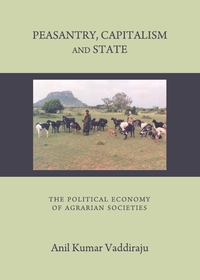Peasantry, Capitalism and State: The Political Economy of Agrarian Societies
Par : Anil Kumar Vaddiraju
Release date: Jan 2013
Cambridge Scholars Publishing, Newcastle upon Tyne, UK
Nombre de pages: 101
ISBN: 9781443844246


In large parts of the developing world, peasant to industrial worker and rural to urban transition is a huge question mark on the face of the political economies of these societies. In India alone, nearly seventy percent of its 1.2 billion population lives in rural areas dependent on agriculture and allied activities. Though the context is different, the magnitude of the transition is similar in present day China. In many parts of Latin America and Africa, this transition is incomplete. Rural populations continue to persist, even in the times of globalisation – a so called shrinking world – and the digital age. In the context of developing countries in general and India in particular, it is difficult to find this transition in the lines of European history. Hence, the main concern of this book is with the large, independent self-cultivating peasantry and the agriculture-associated, non-landowning peasantry. In the present and in these contexts, the process of the growth of towns, merchandise, cities and industry, does not occur in a sequence of succession – characteristic to European development – owing to colonial backdrops and historical specificities. Whatever urbanisation happens in these countries, too, does not seem to be inclusive and facilitative of the rural to urban transition. The variance with the European context also appears to be the reason for the often observed non-absorption of the peasantry. These large differences across spatial, historical and structural contexts also indicate that one should consider the processes in non-Euro-centric terms. The processes of the transformation from agrarian to non-agrarian society – rural to urban societies, therefore – are inevitably plural in nature and, while retaining their specificities, push us into considering the point that the European model, or the English model, of transition is only one important variant of the possible modes of transition to capitalism, which necessitates close empirical study and a considered generalization; a point illuminated by the diversities that characterise European history itself.
However, we need to urgently address this problem, as overwhelmingly large sections of the developing world not only persist in rural bewilderment, but they also aspire to urban modernity, as does the rest of the world. This book is written with a certain empathy towards rural societies, that they too, while transcending the ascriptive particularities and backwardness, should access all the benefits of civilised urban modernity; that the increasingly globalising humanity can offer and, yes, bask in the ‘bright lights of the city’.
Anil Kumar Vaddiraju teaches Political Science at the Institute for Social and Economic Change, Bangalore, India. He received his MPhil and PhD degrees from the University of Delhi.











